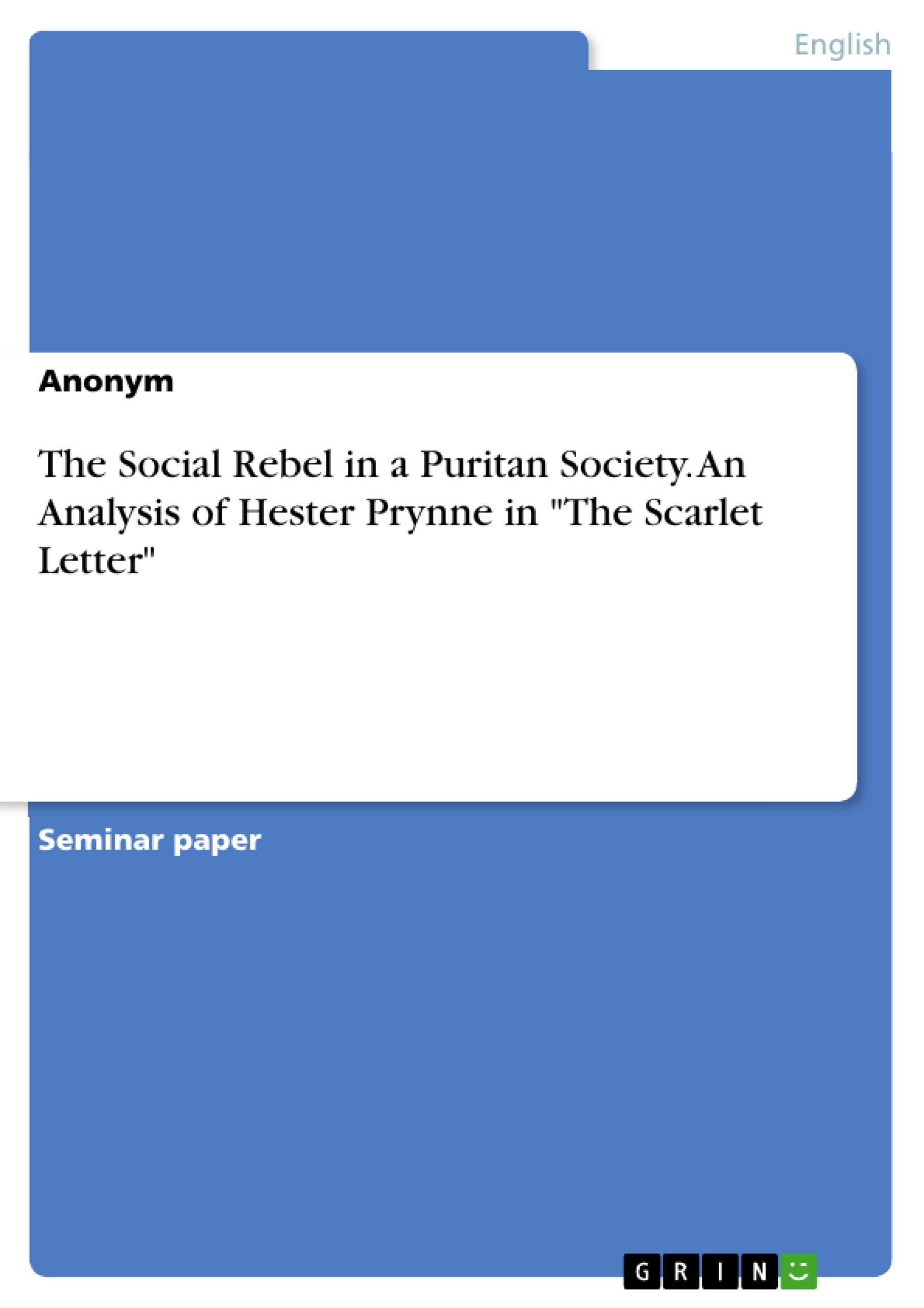This study provides an analysis of the protagonist, Hester Prynne, in Nathaniel Hawthorne's "The Scarlet Letter" as a social rebel in a puritan society. It offers a thorough examination of her actions and decisions that diverge her from societal norms and expectations of her time. Furthermore, it scrutinizes the narrator's view of women and his role as a man of his time.
Table of Contents
- 1. Introduction: The Emancipated View on Women of the Narrator
- 2. The Narrator: A Man of his Time
- 3. Hester's Free Will as an Indication for her Being a Social Rebel
Objectives and Key Themes
This paper aims to analyze the portrayal of Hester Prynne in Nathaniel Hawthorne's The Scarlet Letter, arguing that her actions are driven by free will rather than solely by Puritan societal constraints. The analysis will explore the narrator's perspective, examining how his 19th-century romantic viewpoint influences his interpretation of Puritan society and Hester's transgression.
- Hester Prynne as a social rebel within Puritan society.
- The narrator's 19th-century romantic perspective and its impact on the narrative.
- The hypocrisy and rigid morality of Puritan society.
- The role of free will in Hester's actions.
- The symbolic representation of Hester's sin and its consequences.
Chapter Summaries
1. Introduction: The Emancipated View on Women of the Narrator: This introductory chapter sets the stage by establishing the historical context of The Scarlet Letter within 17th-century Puritan society, where women were largely subordinate to men. It highlights the unforgivable nature of adultery and the strict punishments associated with it. The chapter introduces the narrator, an officer who discovers a 200-year-old manuscript, and emphasizes his more progressive, romantic viewpoint that contrasts with the rigid Puritan perspective. The narrator's belief in progress and his rejection of Puritan values are presented as crucial to understanding his interpretation of Hester Prynne's actions. The introduction posits Hester as a social rebel whose actions stem from her own free will rather than simply adherence to, or rebellion against, Puritan norms.
2. The Narrator: A Man of his Time: This chapter delves into the narrator's 19th-century perspective, contrasting it with the Puritan society depicted in the novel. The narrator's view is characterized by a romantic lens, showing a clear distinction between the "old time" of the Puritans and the narrator's present. He critiques the Puritans' rigid morality, highlighting their hypocrisy and the conflation of religion and law. The chapter emphasizes the narrator's belief that the Puritans were narrow-minded and self-righteous "judges," often failing to live up to their own moral standards. This critique is further reinforced by descriptions of Puritan portraits as stern and judgmental, implying the persistence of these values even into the narrator's time. The narrator's perspective, therefore, is vital to understanding his empathy towards Hester, as his understanding of Puritan hypocrisy mitigates the severity of her crime in his eyes. The chapter establishes the narrator's compassionate stance toward Hester and her plight.
Keywords
The Scarlet Letter, Nathaniel Hawthorne, Puritanism, social rebellion, free will, hypocrisy, romanticism, adultery, Hester Prynne, 17th-century society, gender roles, moral ambiguity.
Nathaniel Hawthorne's The Scarlet Letter: FAQ
What is the main focus of this academic paper?
This paper analyzes the portrayal of Hester Prynne in Nathaniel Hawthorne's The Scarlet Letter, arguing that her actions are driven by free will and not solely by Puritan societal constraints. It examines the narrator's 19th-century romantic perspective and how it influences his interpretation of Puritan society and Hester's transgression.
What are the key themes explored in the paper?
Key themes include Hester Prynne as a social rebel, the narrator's 19th-century romantic perspective, the hypocrisy and rigid morality of Puritan society, the role of free will in Hester's actions, and the symbolic representation of Hester's sin and its consequences.
What is the significance of the narrator's perspective?
The narrator's 19th-century romantic viewpoint is crucial. It contrasts sharply with the rigid Puritan society depicted in the novel, influencing his interpretation of Hester's actions and allowing for a more empathetic understanding of her situation. The narrator's critique of Puritan hypocrisy mitigates the severity of Hester's crime in his eyes.
How does the paper analyze Hester Prynne's actions?
The paper argues that Hester's actions are driven by free will, not merely by rebellion against Puritan norms. Her defiance is presented as an act of agency within a restrictive society.
What is the historical context of the novel and its relevance to the paper?
The paper establishes the historical context of 17th-century Puritan society, where women were largely subordinate and adultery was unforgivable. This context is vital to understanding the severity of Hester's transgression and the societal response to it. The contrast between Puritan society and the narrator's modern perspective is a central focus.
What are the chapter summaries provided in the preview?
The preview includes summaries of three chapters: The introduction establishes the historical context and the narrator's progressive viewpoint. The second chapter delves into the narrator's 19th-century perspective and its contrast with Puritan society. The provided summaries highlight the narrator's empathy towards Hester and his critique of Puritan hypocrisy.
What are the keywords associated with this academic paper?
Keywords include The Scarlet Letter, Nathaniel Hawthorne, Puritanism, social rebellion, free will, hypocrisy, romanticism, adultery, Hester Prynne, 17th-century society, gender roles, and moral ambiguity.
What kind of information does this HTML preview provide?
This HTML preview offers a comprehensive overview of the academic paper, including the title, table of contents, objectives and key themes, chapter summaries, and keywords. It is intended for academic use and analysis of themes within the literary work.
- Quote paper
- Anonym (Author), 2016, The Social Rebel in a Puritan Society. An Analysis of Hester Prynne in "The Scarlet Letter", Munich, GRIN Verlag, https://www.hausarbeiten.de/document/1373989


